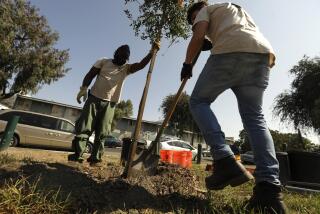Ventura City Hall Joins Boycott of Hardwoods
In a show of solidarity with the worldwide rain forest preservation movement, the Ventura City Council voted Monday night to ban the purchase of hardwoods by the city government.
Ventura joins about 10 U.S. states and cities--including Santa Monica, San Francisco and Berkeley--in boycotting tropical wood to help stop the destruction of rain forests in South America, Asia and Africa.
The action, which passed on a 6-1 vote, was taken at the recommendation of Mayor Gregory L. Carson, who said he got the idea from a man who addressed the council a couple of months ago.
“I thought it was a good idea,” said Carson, who was elected to office in November on a pro-business slate. “The rain forest is a cause within the whole environmental movement, which I’m concerned about. . . . I try to be ecologically sound.”
But one councilman and the owners of the county’s largest hardwood distributor objected to the idea. They said Ventura should focus on its own problems.
“Here we don’t have enough time to get some of the things done we need to get done,” said Councilman James L. Monahan, who voted against the measure. “Yet we’re spending time on something in Ecuador, ah, I mean Brazil. I cannot support it.”
Chuck Renstrom, part owner of H & M Hardwoods & Moldings in Camarillo, added: “I don’t think the city has the right to impose their attitudes on private business. . . . I think their time could be much better spent.”
He said about a quarter of the wood at his Camarillo store is from tropical forests, but he does not remember selling any of it to Ventura.
Ventura officials said the city government does not typically purchase much tropical hardwood, and therefore the ban will have little direct impact on the lumber industry.
But they say it is important for Ventura to set an example for its residents and other cities.
“We can make a difference on issues of world concern,” said Deputy Mayor Todd J. Collart. “I hope other cities follow suit.”
Under the city ordinance, the boycotted hardwoods include teak, mahogany and rosewood, along with several dozen others. The ban applies only to the city and the contractors it hires.
Susan Vernand, the purchasing and services manager for Ventura, said she spent about 12 hours preparing the measure. She said she worked closely with the Rain Forest Action Network, based in San Francisco, in formulating the language of the ordinance.
Victor Menotti, the network’s information coordinator, said the city’s action will “send a big message.”
“It will show that people here are frustrated and want to do something about saving tropical forests,” Menotti said. “It says that taxpayer dollars are not going to fund rain forest destruction.”
Every year, he said, 42 million acres of rain forest are destroyed worldwide. Environmentalists fear that continuing devastation will endanger many animal species and eliminate one of the world’s largest sources of oxygen.
Since the Rain Forest Action Network was formed about two years ago, it has been urging state and local governments to join the boycott, Menotti said.
In October, the city of Santa Clarita joined the boycott at the urging of a group of fifth-grade students. And in October, 1990, Santa Monica decided to prohibit itself from buying the environmentally taboo wood.
“It’s a small planet,” Ventura Assistant City Manager Lauraine Brekke said. “Every little bit can help.”
Ventura Chamber of Commerce President Mel Sheeler said he had no problems with the city’s new posture. “We need to look at things like this to protect the environment,” he said.
More to Read
Sign up for Essential California
The most important California stories and recommendations in your inbox every morning.
You may occasionally receive promotional content from the Los Angeles Times.









